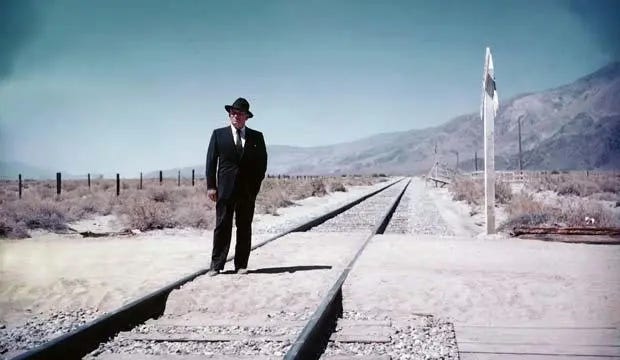Not that Spencer Tracy was a writer - but in Bad Day at Black Rock he was an outsider in a hostile world searching for another outsider (who, as it turned out, had been murdered). And if that wasn’t bad enough, Tracy only had one working arm.
If you’re a writer, that underlying scenario might feel familiar: “No-one understands me!”, “I can’t find what I’m looking for!”, “I’m all alone”, “I’ve got one hand tied behind my back!” (The tying would have been affected by work, family, self-doubt, outside circumstance… and sometimes those knots can be tied pretty tight!)
Luckily there is help at hand in that we might not have to face the world alone: writing groups, for example; courses & retreats; and yes, the sense of ‘community’ on Substack, everyone claiming to be in the same boat, sharing work, ideas, stories, suggestions, each of us shouting out into the void hoping to be heard.
And hoping that boat we’re on isn’t the Titanic…
But when it comes down to it, to the nuts and bolts of the activity in which we’re engaged, we are alone - and inside ourselves too. The act of writing, the translation of synaptic events through to our fingers (or voice) and onto a ‘page’ of some kind can only be a solitary activity. The ‘let’s all take fifteen minutes to write together’ type exercise is no more than a brief comfort blanket- if it works for you at all, that is. Such ‘collaboration’ (surely no more than a veneer) may take you ‘outside of yourself’ for a moment, provide a modicum of support, offer a dose of writerly medicine. If so, then fair enough; but it still doesn’t alleviate the grind, the fact that you’ve got to do this thing on your own.
Or, as the Tracy image suggests, you could just wait for the next train out of here, head back to civilisation, hang up the metaphorical pen, abandon the quest… But for most writers - addicts that we are! - I suspect that’s an impossibility.
So how do we survive being alone in the desert? Or waiting for a train that might never come? Or overcome the constant fear that we’ll hear the ship’s alarm calling us to lifeboat stations?
Settle on a project in which you believe - and ignore what everyone else says about it. Tracy had a quest and, even in the face of people trying to deflect him from it, he was going to see it through whatever it took.
Find a means of working that frees you (as best it can and for as long as possible) from having one arm tied behind your back. It might be a routine, a place to write, a way of writing (computer, longhand, voice recording). You’ve just got to find it. Trial and error. Tracy’s job would have been much easier had he both arms to work with…
Trust your instincts, your project, your talent, your quest. There is something inherently selfish and arrogant about being a writer; don’t be apologetic about what you’ve found yourself compelled to do!
And if you need them from time-to-time, pull out those comfort blankets, occasionally wrap yourself in them - but never let yourself believe that they alone are ‘the answer’. You are the answer - and only you.
No matter who we are, I think it can be of value to occasionally remind ourselves of some of the basics. Just imagine if you didn’t. I suspect there are many people on Substack who have become something else over time, something commercial and branded, ‘an influencer’ chasing metrics, and not what they set out to be years ago.
Tracy could have caved in to the pressure applied by the Black Rock locals - but he didn’t.
So take care - and take care of yourself. Be suitably introspective and self-assessing, otherwise you might end up an entirely different kind of person, a different kind of writer - or not even a writer at all!





Tracy eventually got out of Black Rock and into his next movie, so we writers need to remember that bad times will eventually pass.